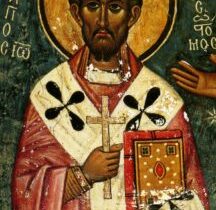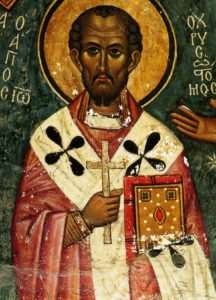How to be Thankful
I urge that supplications, prayers, intercessions, and thanksgivings be made for all people.- 1 Tim 2:1
In my previous post I wrote about the life of thankfulness that comes from intentionally partaking of the Eucharist with a spirit of thanksgiving. I shared how my fear of God’s judgment limited my experience of joy when I received the bread and the wine. In this post I will ask how does a life of thankfulness inspired by the sacrament help us destroy the envy that seeks to rule our lives. To do this I am going to turn to St. John Chrysostom: a fourth century father of the church who is celebrated this week in Catholic and Anglican churches.
John Chrysostom was born in Antioch in 349. He was classically trained in rhetoric and Greek. When he turned 26 he left Antioch to become a hermit. His severe asceticism had detrimental effects on his health. He returned to Antioch where he preached his famous homilies—most of which we have till this day. In these homilies he was quite critical of the way the poor were treated in Antioch. He was appointed Archbishop of Constantinople in 397. In Constantinople he was not well liked. He quickly made an enemy of the wife of the Emperor. He was banished from Constantinople in 403, invited back, and again banished in 405. He died in 407. His last words were “Glory be to God for all things!”
In his 25th homily on St. Matthew, Chrysostom gets to the heart of how to be thankful. He writes, “thanksgiving itself adds nothing to [God], but causes us to be nearer to Him.” Chrysostom continues his theme later by saying a lack of thankfulness “springs from pride, and from thinking one’s self worthy of something.”[1] For people like me who struggle with the envy that stems from and causes anxiety these quotes should make us stop dead in our tracks. Envy, Chrysostom is saying, stems from a lack of thankfulness. We become jealous when we see others receive a gift that we think we deserve.
It may seem that thankfulness is an easy solution to a cycle of envy and anxiety. It is not. I don’t know about you, but when I am stuck in this cycle it is hard to look at my life and be thankful about anything. In these times it is quite easy to be negative about my own life because everyone else seems to be better off and happier than I am. In these times a spirit of negativity attaches itself to me, and there is little I find merit in.
To combat this Chrysostom exhorts us to “be thankful not for our own blessings alone, but also for those of others; for in this way we shall be able both to destroy our envy, and to rivet our charity, and make it more genuine. Since it will not even be possible for thee to go on envying them, in behalf of whom thou givest thanks to the Lord.”[2] In this appeal, Chrysostom reminds us to turn from ourselves, and our perceived lack of blessing, so that we may give thanks for the blessings of God experienced by others. This counterintuitive turn flips our vision from an internal navel gazing to the world and to the love of Christ that is pouring out for the world; it calls us not only to a spirit of thankfulness, but it also draws us into a life of charity.
When we live a life of charity that is spurred on by our thankfulness we mirror the love of God, for God is thankful for us, and God’s thankfulness is revealed to us as love. We know that God is thankful for us because Christ came so we could receive him as a gift. In the same manner we show our thankfulness to God by setting aside our righteousness—what we think we deserve—so that we may serve others in order that they may receive us as a gift. Therefore, when we follow Chrysostom’s advice that we be thankful for the blessings bestowed upon others we are following Christ’s example.
When we rivet ourselves to charity, literally binding ourselves to Christ, we mirror God’s action in our lives to the world—for God’s thankfulness for us is not determined by whether or not we deserve it; instead the thankfulness of God, as seen through the life of Christ, is determined by his desire to be in relationship with us. To be thankful for someone is to be in relationship with them; to be thankful is to be present; to be thankful for someone is the act of setting aside your differences for the union found each week in the great Eucharistic feast. Let us show our thankfulness this week in our acts of charity towards others. Through our thankfulness may our lives become the embodiment of the final words of St. John Chrysostom, “Glory be to God for all things.” Amen.
[1] St. John Chrysostom, “Homily XXV, on Matthew 7.28,” in Nicene and Post Nicene Fathers. First Series, Vol. 10, St. Chrysostom, Homilies on St. Matthew., ed. Philip Schaff, trans. Rev. Sir George Prevost, (Grand Rapids: Eerdmans, 1978), 174-175.
[2] Ibid, 174.
A.A. Grudem
Latest posts by A.A. Grudem (see all)
- How to be Thankful - September 12, 2016
- The Feast of Thanksgiving - August 12, 2016
- The Nicene Creed: “And [we believe] in the Holy Ghost…” - July 7, 2016


